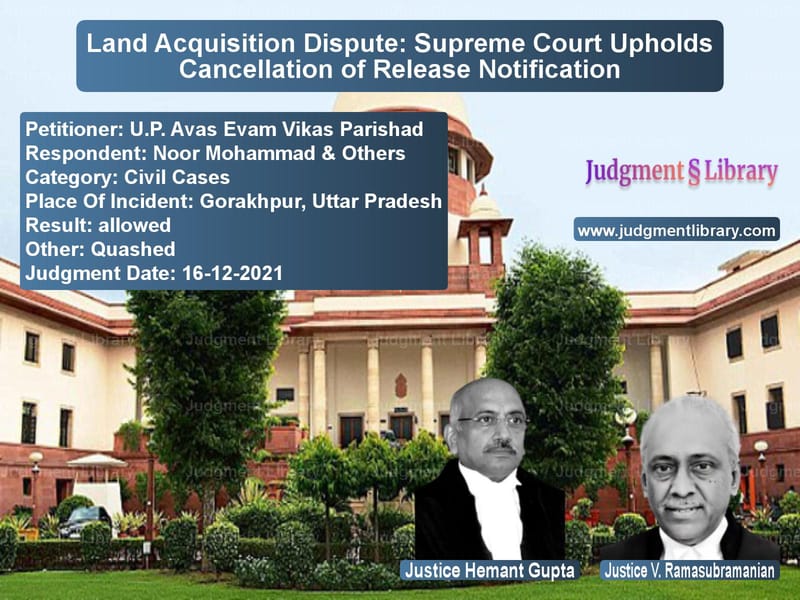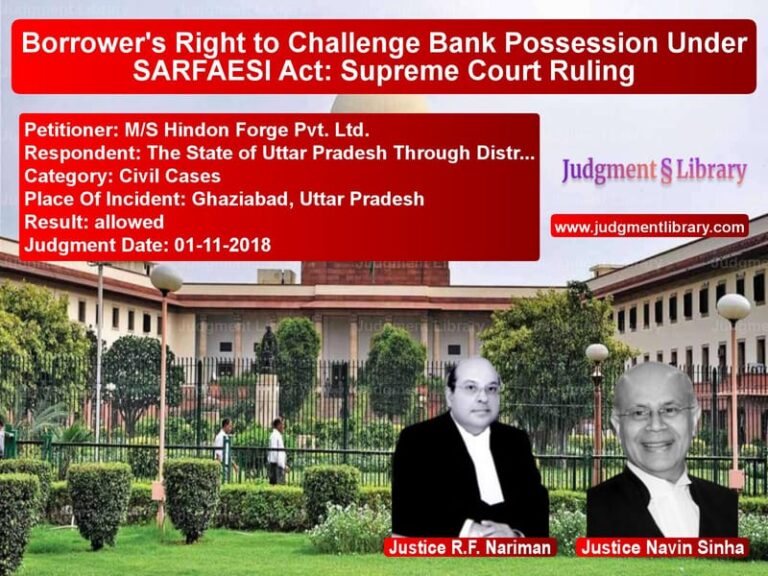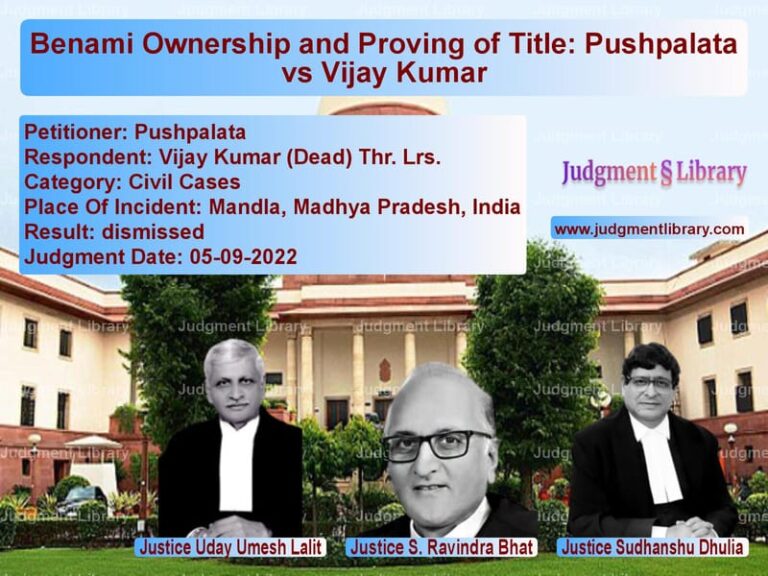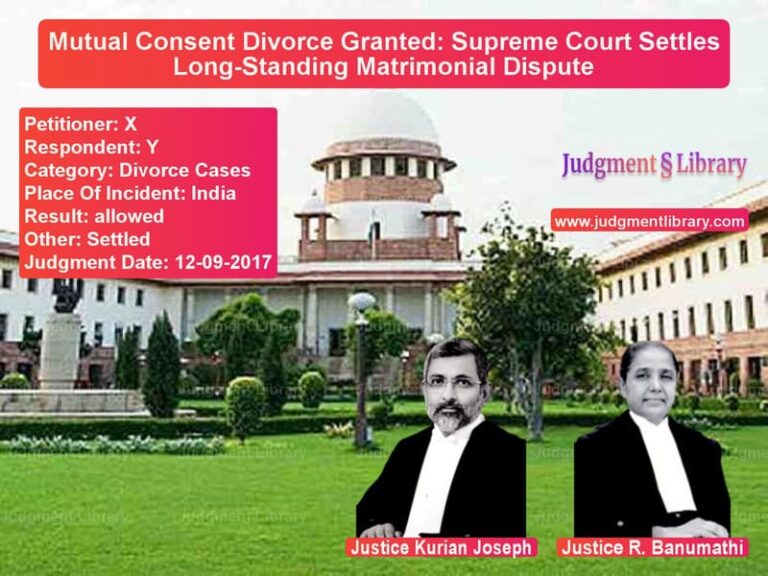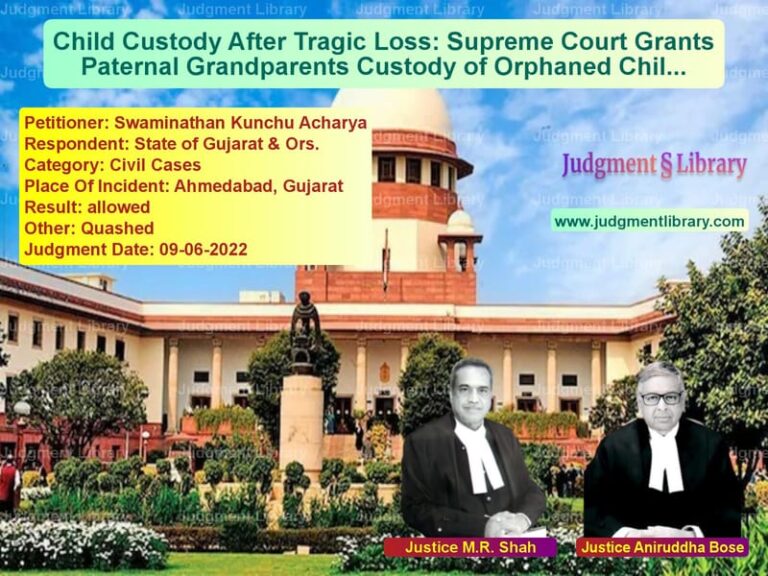Land Acquisition Dispute: Supreme Court Upholds Cancellation of Release Notification
The Supreme Court of India recently adjudicated a critical land acquisition dispute in the case of U.P. Avas Evam Vikas Parishad vs. Noor Mohammad & Others. The matter involved the cancellation of a notification that had initially released land from acquisition. The Court addressed key issues surrounding the vested rights of landowners, the powers of the state government to rescind notifications, and the principle of fraud in administrative decisions.
The case stems from a long-drawn legal battle over land in Gorakhpur, Uttar Pradesh, which was originally acquired for housing and development purposes. The landowners, after securing the release of their land on the pretext of personal necessity, engaged in commercial transactions, leading to the state government reversing its decision.
Background of the Case
The dispute revolves around land acquisition under the U.P. Town Improvement Act, 1919, and the Land Acquisition Act, 1894. A notification dated 25.07.1964 was issued by the state government to acquire land in Village Mirzapur, Gorakhpur, for a public housing project. Subsequently, possession was taken on 24.07.1970, and compensation was awarded on 30.03.1971.
From 1983 onwards, the landowners made repeated attempts to get the land released from acquisition. After a series of representations and legal battles, the state government issued a notification on 07.04.2003 exempting the land from acquisition. However, on realizing that the exemption was obtained through misrepresentation and fraud, the government canceled the notification on 15.09.2005.
Petitioner’s Arguments
The U.P. Avas Evam Vikas Parishad, a statutory body responsible for housing development, argued that the landowners had misrepresented facts to secure the exemption. They contended that:
- The landowners falsely claimed that the land contained ancestral cemeteries and was necessary for their livelihood.
- The landowners had assured the government that they would not sell the land.
- Contrary to their assurances, they engaged in commercial transactions by selling plots to third parties.
- Since the exemption was secured through fraud, the government was well within its rights to cancel the notification.
Respondent’s Arguments
The respondents, i.e., the original landowners, contended that:
- Once the land was released from acquisition through a notification under Section 48(1) of the Land Acquisition Act, it was vested back in them.
- The government could not unilaterally cancel the exemption without initiating fresh acquisition proceedings.
- The cancellation violated their constitutional right to property under Article 300A.
- The General Clauses Act, 1897, could not be used to rescind a notification that had conferred vested rights in immovable property.
Supreme Court’s Key Observations
The Supreme Court critically examined the legal aspects of the case and ruled in favor of the U.P. Avas Evam Vikas Parishad. The Court made the following observations:
1. Power to Rescind Notifications:
The Court held that the government has the power to rescind notifications under Section 21 of the General Clauses Act, 1897, which states:
“Where, by any Central Act or Regulations, a power to issue notifications, orders, rules, or bye-laws is conferred, then that power includes a power to add to, amend, vary or rescind any notifications, orders, rules, or bye-laws so issued.”
Read also: https://judgmentlibrary.com/supreme-court-restores-money-suit-decrees-in-family-business-dispute/
Thus, the Supreme Court rejected the argument that once land was released, the government could not revoke its decision.
2. Fraud Nullifies Legal Rights:
The Court emphasized that fraud vitiates everything. It found that the landowners had misled the government by falsely claiming that they required the land for residential and religious purposes while secretly engaging in commercial transactions. The Court remarked:
“The landowners were actually playing hide and seek by pleading religious sentiments, leading to the issue of the Notification dated 07.04.2003. The Notification under Section 48(1) was invited by the landowners by making false representations.”
Read also: https://judgmentlibrary.com/supreme-court-upholds-high-court-order-in-telangana-land-dispute-case/
The Court ruled that a right obtained through misrepresentation or fraud cannot be legally protected.
3. Section 48(1) is Administrative, Not Quasi-Judicial:
The Supreme Court clarified that the power exercised under Section 48(1) of the Land Acquisition Act is purely administrative. It does not require prior notice or an opportunity to be heard, as it is not a quasi-judicial proceeding.
“While a Notification for acquisition under Section 4(1) seeks to take away an individual’s right to property, a Notification under Section 48(1) confers a benefit upon an individual and hence is not subject to the same procedural safeguards.”
4. No Vested Rights in Fraudulent Transactions:
The Court held that the concept of vested rights does not apply when the initial grant of exemption was based on misrepresentation. The Court cited the principle that an order obtained through fraud does not confer any legal rights.
Supreme Court’s Verdict
After considering all aspects of the case, the Supreme Court ruled:
- The cancellation of the exemption notification dated 15.09.2005 was valid and legal.
- The High Court’s decision setting aside the cancellation was incorrect and was quashed.
- The U.P. Avas Evam Vikas Parishad was entitled to proceed with the development of the land as per the original acquisition.
Implications of the Judgment
This landmark judgment has significant implications for land acquisition cases and fraudulent claims:
- Strengthening Government Authority: The ruling reinforces the government’s ability to rescind fraudulent exemptions.
- Deterrence Against Fraud: Individuals or entities attempting to mislead the government will not be able to claim vested rights.
- Impact on Land Acquisition Cases: The judgment clarifies that exemption notifications under Section 48(1) are administrative and can be revoked if obtained fraudulently.
The decision upholds the principle that no individual can benefit from deceit and underscores the judiciary’s commitment to preventing abuse of legal provisions for personal gain.
Petitioner Name: U.P. Avas Evam Vikas Parishad.Respondent Name: Noor Mohammad & Others.Judgment By: Justice Hemant Gupta, Justice V. Ramasubramanian.Place Of Incident: Gorakhpur, Uttar Pradesh.Judgment Date: 16-12-2021.
Don’t miss out on the full details! Download the complete judgment in PDF format below and gain valuable insights instantly!
Download Judgment: u.p.-avas-evam-vikas-vs-noor-mohammad-&-othe-supreme-court-of-india-judgment-dated-16-12-2021.pdf
Directly Download Judgment: Directly download this Judgment
See all petitions in Property Disputes
See all petitions in Landlord-Tenant Disputes
See all petitions in Contract Disputes
See all petitions in Judgment by Hemant Gupta
See all petitions in Judgment by V. Ramasubramanian
See all petitions in allowed
See all petitions in Quashed
See all petitions in supreme court of India judgments December 2021
See all petitions in 2021 judgments
See all posts in Civil Cases Category
See all allowed petitions in Civil Cases Category
See all Dismissed petitions in Civil Cases Category
See all partially allowed petitions in Civil Cases Category

